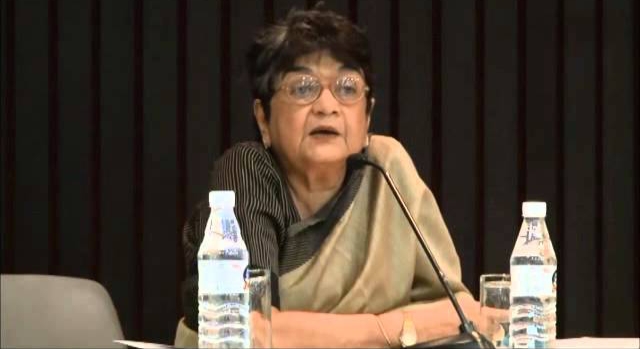Aastha Pareek
Justice Ruma Pal is one of the most distinguished and respected figures in Indian judicial history, known for her intellect, integrity, and landmark judgments that have significantly shaped the country’s legal landscape. Serving as a Supreme Court Judge from 2000 to 2006, Justice Pal became an icon of judicial independence and a champion of gender justice, constitutional law, and human rights. Her journey is marked by professional excellence and a personal life that exemplified simplicity and dedication to the principles of justice.
Early Life and Education
Born on June 3, 1941, in Kolkata, West Bengal, Ruma Pal hailed from a family that valued education and intellectual pursuits. She completed her early schooling at Loreto House, Kolkata, one of the premier institutions of the time. After finishing school, she pursued her higher education at Presidency College, Kolkata, where she studied English literature.
Her interest in law developed later, leading her to study at the Department of Law, University of Calcutta, where she earned her Bachelor of Laws (LLB). Justice Pal then went on to the University of Oxford, where she deepened her legal understanding, a journey that contributed to her sharp analytical skills and in-depth grasp of constitutional principles.
Judicial Career
Justice Ruma Pal’s judicial career began in the Calcutta High Court, where she was appointed as a Judge in 1989. Her career trajectory rapidly ascended, owing to her sharp legal mind, commitment to constitutional values, and an unflinching dedication to justice. Over her years at the Calcutta High Court, she earned a formidable reputation in civil, constitutional, and commercial law, becoming known for her precision and clarity in judgment.
In 2000, she was appointed to the Supreme Court of India, where she served until her retirement in 2006. Throughout her tenure, she was one of the most formidable and influential voices on the bench. Justice Pal was widely regarded for her fierce independence, maintaining the integrity of her office without ever yielding to political pressures or societal expectations.
Landmark Judgments
Justice Pal’s career on the Supreme Court bench was marked by a number of landmark judgments that have had a lasting impact on Indian law and society. Some of the most notable ones include:
1. Aruna Roy v. Union of India (2002):Justice Ruma Pal was part of a bench that ruled on the constitutional validity of government-funded schools teaching the Vedic and Puranic values as part of their curricula. The judgment upheld the secular fabric of the Indian Constitution by ensuring that no particular religious ideology could dominate public education.
2. Vishaka & Ors. v. State of Rajasthan (1997): Though not the author of the judgment, Justice Pal was a strong proponent of the Vishaka guidelines that laid the foundation for the legal framework concerning sexual harassment at the workplace. This case established preventive measures for workplace sexual harassment, fundamentally shifting the rights of women in employment.
3. Selvi v. State of Karnataka (2010): This judgment dealt with the use of narco-analysis and other forms of scientific tests in criminal investigations. Justice Pal ruled that such tests without consent violate the right against self-incrimination as protected by Article 20(3) of the Constitution. The judgment reinforced the protection of individual liberties and privacy against intrusive state measures.
4. Thomson Press (India) Ltd. v. Nanak Builders & Investors P. Ltd. (2003): Justice Pal’s judgment in this case contributed to commercial law by interpreting key contractual provisions and providing clarity on the issue of legal notice requirements, ultimately strengthening India’s contract law framework.
5. P.A. Inamdar v. State of Maharashtra (2005): In this important case on education, the Bench, which included Justice Pal, held that state governments cannot impose their reservations policy on unaided private educational institutions, protecting the autonomy of private educational institutions from excessive government interference.
Advocacy for Judicial Transparency and Accountability
Justice Pal has not hesitated to speak out on critical issues related to the judicial system. After her retirement, she became an outspoken advocate for judicial transparency and accountability, criticizing the lack of transparency in the collegium system used for appointing judges to the higher judiciary.
In a rare and candid public lecture in 2011, Justice Pal raised concerns about judicial corruption, lack of accountability, and the increasing opaqueness in the appointment process. Her critique focused on the collegium system, calling for greater transparency and systemic reforms.
Legacy
Justice Ruma Pal’s legacy extends beyond the judgments she delivered. She remains a symbol of judicial integrity and progressive thought, advocating for a fair, transparent, and accountable judiciary. Her unwavering commitment to gender equality, constitutional principles, and human rights has inspired a new generation of lawyers and judges in India.
As a jurist, she combined intellectual rigor with moral clarity, leaving an indelible mark on the Indian judiciary. Even after her retirement, her speeches and writings continue to shape public discourse on the role of the judiciary, making her a revered figure in both legal and academic circles.
Justice Ruma Pal’s journey is a testament to how one can navigate personal simplicity and professional excellence to effect meaningful change in society. Her work, especially in the realm of constitutional law and gender justice, will continue to inspire and guide the legal community for years to come.


